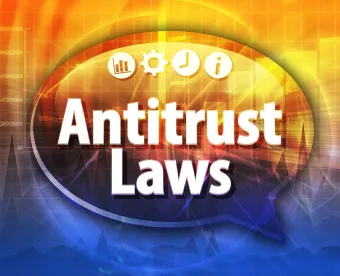The Antitrust Criminal Penalty Enhancement and Reform Act (ACPERA), which provides additional benefits to the Leniency Program within the Department of Justice (DOJ), was reauthorized by President Trump on October 1, 2020. Most importantly, the reauthorization repealed the ACPERA sunset provisions, effectively making it permanent.
What is the Leniency Program and ACPERA?
In 1993, the DOJ Antitrust Division implemented the Leniency Program as a tool to encourage corporations to be forthcoming on any criminal antitrust violations and to assist the government in investigating these bad acts. The DOJ’s Leniency Program, sometimes referred to as the amnesty program, allows corporations to report their illegal antitrust activities at an early stage. Most importantly, if the corporation cooperates with the DOJ it can avoid criminal conviction and hefty fines, and its employees can avoid criminal convictions, fines and prison sentences.
Congress enacted ACPERA in 2004. The purpose of ACPERA is to provide greater incentives for corporations to self-report illegal, criminal antitrust activity and to cooperate with the DOJ in conjunction with the Leniency Program. Specifically, the incentive under ACPERA reduces a corporation’s liability in private civil cases. According to the DOJ, ACPERA “fight[s] to safeguard our free markets and protect American consumers from collusion” and “conspiracies among competitors to fix prices, rig bids, and allocate markets.” The DOJ views these antitrust violation as “categorically and irredeemably anticompetitive” and contrary to “the competition policy of the United States.”
What Are the Requirements for Securing Leniency?
Under the DOJ’s Corporate Leniency Policy, and in order to secure the benefits available to a leniency applicant, a corporation must:
-
Be the first to report the illegal activity before any DOJ investigation has begun or information is received about the illegal activity.
-
Terminate its participation in the illegal activity.
-
Maintain “[c]ontinuing and complete” cooperation with DOJ officials and their investigation.
-
Admit the illegal activity as a corporation and not as isolated confessions from employees.
-
Make restitution to any injured parties and
-
Not be the ringleader or instigator of the illegal activity who coerced others to engage in the illegal acts.
If a corporation meets the above requirements, then all employees of the corporation who admitted their involvement in the illegal activity will receive leniency and will not be criminally charged. However, if a corporation cannot meet the above requirements, it still may be granted leniency if the following conditions are met:
-
The corporation is the first to report the illegal activity even if the DOJ investigation has begun.
-
The DOJ does not have evidence against the corporation yet that is likely to result in sustainable conviction.
-
The corporation terminates its participation in the illegal activity.
-
The corporation provides “[c]ontinuing and complete” cooperation that advances the DOJ’s investigation.
-
The corporation admits the illegal activity as a corporation and not as isolated confessions from employees.
-
The corporation makes restitution to any injured parties and
-
The DOJ determines that granting leniency to the corporation would not be unfair to other players in the illegal activity, the nature of the illegal activity, the corporation’s role in the illegal activity and the timing of the corporation’s confession.
The seventh condition is considered on a case-by-case inquiry. The earlier the corporation discloses its involvement, or if it had a limited rather than a substantial role, in the illegal activity, the better it is for the corporation. If the corporation meets the above requirements, the DOJ will consider giving individual leniency to the employees who come forward with the corporation about the illegal activity.
The DOJ also can grant leniency to individuals who disclose illegal activity to the DOJ on their own behalf and not with a corporation. The requirements for an individual leniency applicant are fewer. First, the individual must be the first to report the illegal activity before any DOJ investigation or information is received by the DOJ from another source. Second, the individual must provide “full, continuing and complete cooperation” throughout the DOJ’s investigation. Third, the individual cannot have coerced others to participate in the illegal activity or been the ringleader of the illegal activity.
What Are the Potential Advantages and Disadvantages of Qualifying for Leniency?
While the benefits noted above are substantial, qualifying for the Leniency Program does not mean that corporations have complete protection against plaintiffs in a private lawsuit. Therefore, a significant incentive for admitting guilt and potentially exposing a corporation to civil lawsuits is that ACPERA also reduces a leniency chair-holder’s liability to actual, single damages in a civil matter, rather than the mandatory treble damages codified in 15 U.S.C. § 15. Treble damages are automatic for a prevailing civil plaintiff under the antitrust laws, including the Sherman and Clayton Acts. For example, if a jury enters an award in an antitrust matter, a judge has no choice but to triple the award. That said, it’s imperative that the corporation fully cooperates with the civil plaintiff(s) in order to reap the full ACPERA benefits. The cooperation of the corporation includes:
-
Disclosing all facts relevant to the plaintiff’s civil action.
-
Disclosing all documents relevant to the plaintiff’s civil action and
-
Being available and responding truthfully at depositions, testimonies or interviews that a plaintiff may reasonably request.
Corporations should consult with antitrust counsel to evaluate the many factors that inform whether applying for leniency makes sense under the circumstances, and to navigate the DOJ’s leniency policy to reap the benefits of the policy and ACPERA.





 />i
/>i

